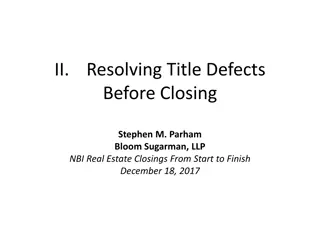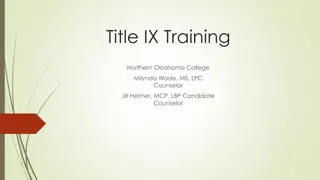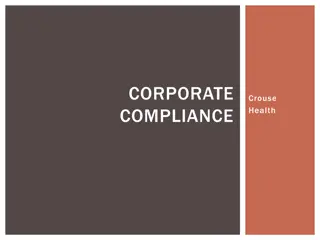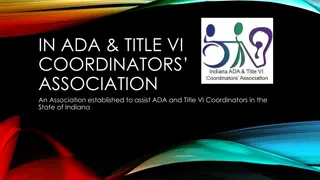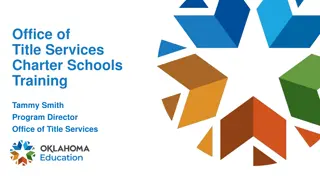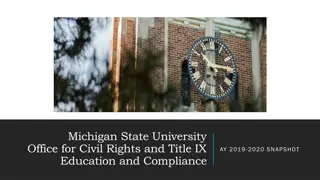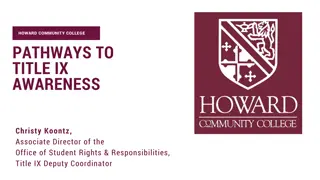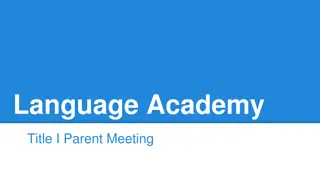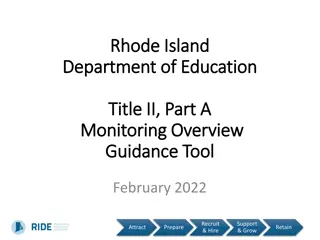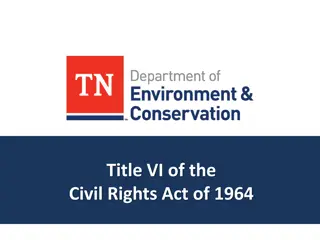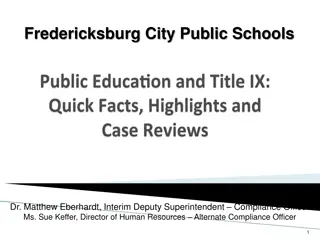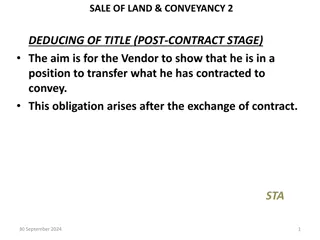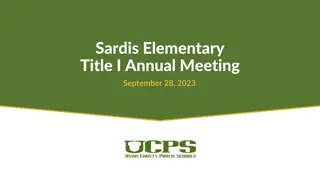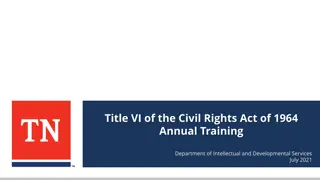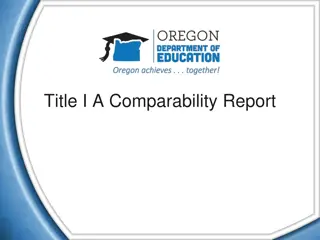Understanding Title IX Compliance in Education
A summary of Title IX, a federal law protecting against sex discrimination in education programs that receive Federal financial assistance. The training covers policy changes, conditions for a formal complaint, and additional criteria for Title IX complaints, including examples of sexual harassment types.
Download Presentation

Please find below an Image/Link to download the presentation.
The content on the website is provided AS IS for your information and personal use only. It may not be sold, licensed, or shared on other websites without obtaining consent from the author. Download presentation by click this link. If you encounter any issues during the download, it is possible that the publisher has removed the file from their server.
E N D
Presentation Transcript
Title IX Title IX Compliance Training This training is a brief summary of Rose-Hulman s Title IX Policy and Procedures. The full policy and procedures can be found here.
What is Title IX Title IX is a federal civil rights law passed as part of the Education Amendments of 1972. This law protects people from discrimination based on sex in education programs or activities that receive Federal financial assistance. Title IX states: No person in the United States shall, on the basis of sex, be excluded from participation in, be denied the benefits of, or be subjected to discrimination under any education program or activity receiving Federal financial assistance. Title IX regulations recognize that sexual harassment, including sexual assault, is unlawful sex discrimination.
Title IX Final Rule On May 6, 2020, the U.S. Department of Education unveiled a Final Rule changing how colleges and universities must handle allegations of sexual misconduct, harassment, and assault effective as of August 14, 2020. These provisions necessitated changes to Rose-Hulman s policies and procedures. This was true for the majority of, if not all, colleges and universities across the country. Changes in the provisions limited the scope of what defines sexual harassment. Changes also allow the accused to cross-examine their accuser. Critics feel that these changes make an already difficult process more traumatic for those who are victims of sexual harassment. Currently, President Biden has ordered education officials to start considering how to rollback these rules. More to come
Conditions for a Formal Title IX Complaint Under Title IX, sexual harassment/misconduct claims must meet one of the following three conditions to qualify as a formal Title IX Complaint. #1 #2 #3 An employee of the recipient conditioning the provision of an aid, benefit, or service of the recipient on an individual s participation in unwelcome sexual conduct. Unwelcome conduct determined by a reasonable person to be so severe, pervasive, and objectively offensive in that it effectively denies a person equal access to the school s education program or activity. This condition is often called hostile environment. This type of sexual misconduct must be based on sex and meet all three measures: severe, pervasive, and objectively offensive. Sexual assault, dating violence, domestic violence, or stalking (as defined in the Clery Act, 20 U.S.C Section 1092(f), and the Violence Against Women Act, 34 U. S. C. Section 12291 (a)), expressly including sexual assault, dating violence, domestic violence, and stalking. This condition is often called quid pro quo or this for that harassment. It is when favorable professional or educational treatment is conditioned on a sexual activity. Title IX now includes the Clery Act/VAWA definitions of dating violence, domestic violence, and stalking.
Additional Conditions for a Formal Title IX Complaint In addition, the following two conditions must also be met to qualify for a formal Title IX Complaint. The conduct must occur within the context of an educational program or activity for which the college or university has jurisdiction over the respondent. The conduct must occur in the United States. The Title IX Coordinator is required to dismiss the reported grievance if allegations do not meet Title IX Conditions. However, dismissal does not preclude action under other policies such as student conduct, faculty handbook, staff handbook etc.
Title IX Applies To Title IX applies to the following relationships: Student to Student Employee to Student Student to Employee Employee to Employee
Reporting Who Can Report? A sexual harassment/misconduct grievance may be reported by anyone to a Responsible Party with the authority to take corrective action on the part of the college or university. Reports can be made through: Email Phone Written Notice In Person
Mandatory Reporters Federal guidelines encourage schools to respect the autonomy of Complainants to allow them some control over when and if alleged sexual harassment is reported and investigated. Rose-Hulman has designated certain individuals as mandatory reporters. If a student or employee chooses to inform any of the following mandatory reporters of allegations of sexual harassment, the mandatory reporter must report the allegations to the Title IX Coordinator. The Title IX Coordinator Vice President of Student Affairs and Dean of Students Vice President for Human and Environmental Services The Ombudsperson Committee All employees in a supervisory role are mandatory reporters of complaints made by employees under their supervision.
Mandatory Reporters Minor Children In compliance with state and federal laws, Rose-Hulman strictly prohibits child abuse, neglect, and sexual abuse of minors by faculty, staff, students, independent contractors, or volunteers. Individuals suspecting abuse of a minor must immediately report the suspected abuse to the Title IX Coordinator. Indiana law also requires mandatory reporting for suspected child abuse or neglect to authorities. Failure to report suspected child abuse or neglect is a Class B misdemeanor. All faculty and staff are mandatory reporters if the person is a minor. Rose-Hulman will immediately investigate all reports of abuse of minors, and Rose-Hulman will inform law enforcement and/or the Indiana Department of Child Services of all reports of child abuse or neglect, including sexual abuse. Rose-Hulman will also report all reported incidents to United Educators.
When A Report is Received Upon receiving notice of an alleged sexual harassment, the Title IX Coordinator will: Contact the Complainant to discuss the availability of supportive measures. Consider the Complainant s wishes with respect to supportive measures. Inform the Complainant of the availability of supportive measures without the filing of a Formal Complaint. Explain to the Complainant the process of filing a Formal Complaint.
Supportive Measures Examples of Supportive Measures include, but are not limited to: Consultation with Public Safety or local law enforcement Rescheduling academic assignments or tests Moving to another course section Adjusting housing arrangements Referral to counseling or other health services Mutual No Contact Orders The Complainant can choose to accept or not accept supportive measures. Supportive measures are free of charge.
Filing a Formal Complaint A Formal Complaint is a document filed by a Complainant or signed by the Title IX Coordinator alleging sexual harassment against a Respondent and requesting a formal investigation, hearing, and determination by Rose-Hulman. A Complainant may file a Formal Complaint with the Title IX Coordinator in person, by mail, by email, or by completing Rose-Hulman s complaint form located at https://www.rose- hulman.edu/about-us/humanresources/incident-report-form.pdf. If filed by a Complainant, the Formal Complaint must include the Complainant s physical or digital signature or otherwise indicate that the Complainant is the person filing the Formal Complaint. While any person may report sexual harassment to the Title IX Coordinator, only a Complainant or the Title IX Coordinator may sign a Formal Complaint. Only the filing of a Formal Complaint signed by a Complainant or the Title IX Coordinator will initiate the Formal Grievance Process.
Dismissal of a Formal Complaint Federal law requires that a formal complaint is dismissed if jurisdictional requirements are not met. The Title IX Coordinator may dismiss the Formal Complaint or any allegations of the Formal Complaint, if at any time during the investigation or hearing: The Complainant notifies the Title IX Coordinator in writing that the Complainant would like to withdraw the Formal Complaint or any allegations in the Formal Complaint. The Respondent is no longer an enrolled student or employed by Rose- Hulman. Specific circumstances prevent Rose-Hulman from gathering evidence sufficient to reach a determination as to the Formal Complaint or any allegations.
Rights of Both Parties Rose-Hulman offers non-disciplinary, non-punitive individualized services to the Complainant and Respondent before, during, and after a Formal Complaint of Sexual Harassment is Filed. A fair and equitable grievance process. An advisor of choice. An appeal process.
Things to Think About These situations are usually very complicated and highly emotional for both parties. There are two sides to every story and the sides can be VERY different. Due to a commitment to privacy for both parties, much information cannot be shared. This can often cause frustration to those who are supporting each party. It is important to remain supportive, keep an open mind, and remain neutral. Offer resources. Kristen Loyd and Kyle Rhodes are always available for questions and concerns.



